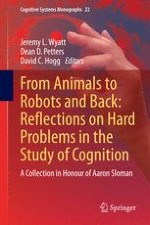2014 | OriginalPaper | Chapter
14. Modelling User Linguistic Communicative Competences for Individual and Collaborative Learning
Authors : Timothy Read, Elena Bárcena
Published in: From Animals to Robots and Back: Reflections on Hard Problems in the Study of Cognition
Publisher: Springer International Publishing
Activate our intelligent search to find suitable subject content or patents.
Select sections of text to find matching patents with Artificial Intelligence. powered by
Select sections of text to find additional relevant content using AI-assisted search. powered by
